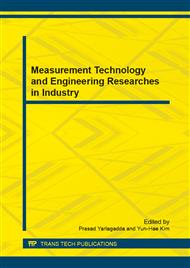p.1353
p.1357
p.1361
p.1366
p.1370
p.1374
p.1379
p.1384
p.1388
Parameters Selection and Optimization of Particle Swarm Optimization Algorithm Based on Molecular Force Model
Abstract:
Inspired by thermodynamics molecular system, the particle swarm optimization algorithm based on the molecular force model (MFMPSO) was proposed. Two parameters were introduced in the MFMPSO algorithm. In this paper, the orthogonal test design method is applied to optimize the parameter combinations of three levels and four factors, which include dl and dh, the population size and the iteration number. The experimental results prove that the population size and the iteration number have litter influence on the MFMPSO algorithm, however dl and dh play a key role and thus the MFMPSO algorithm has good search performance when dl and dh take the values respectively in a certain range which is related with the length of the longest diagonal in the search space.
Info:
Periodical:
Pages:
1370-1373
Citation:
Online since:
July 2013
Authors:
Price:
Сopyright:
© 2013 Trans Tech Publications Ltd. All Rights Reserved
Share:
Citation:


